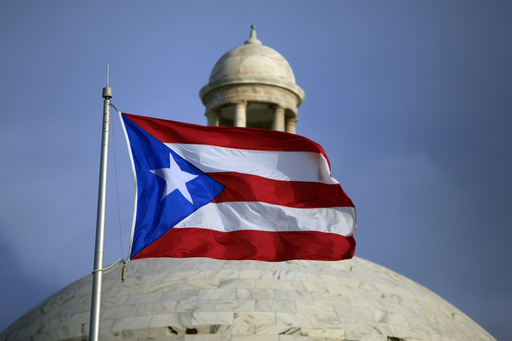
SAN JUAN, Puerto Rico — On Monday, Puerto Rican lawmakers engaged in a heated public meeting regarding a controversial bill supported by the governor that seeks to dismantle renewable energy objectives while also extending the operation of the only coal-fired power plant on the island. This plant has been long criticized for contributing to pollution in low-income neighborhoods.
This controversial legislation directly undermines Puerto Rico’s four-year initiative to boost renewable energy, a campaign bolstered by U.S. federal financial support aimed at mitigating ongoing power shortages as the territory attempts to reduce its reliance on fossil fuels. However, with federal assistance likely to dwindle under President Donald Trump’s administration, and amid growing concerns that the limited scope of renewable projects has done little to improve the consistency of power supply, newly elected Governor Jenniffer González, who aligns with Trump, has introduced a bill to revoke a law mandating that renewable sources provide 40% of the territory’s energy needs by 2025 and 60% by 2040.
“Once we have a stable electricity supply, we can discuss how to meet our future goals,” González stated last week.
Despite the governor’s assertions, environmental advocates and health professionals are voicing strong opposition. Nadya Rivera from Puerto Rico Clinicians for Climate Action expressed her concerns, emphasizing the adverse health impacts associated with coal usage. The island has one of the highest asthma prevalence rates globally, and several medical professionals have reported a disturbing rise in various cancers and other health issues in the southern regions since the plant’s inception.
The newly appointed energy director, Josué Colón, has recently argued for the continuation of coal as an energy source until 2035, flying against public policy which dictates the cessation of coal operations by 2028. The coal facility located in Guayama contributes roughly 20% of the island’s electricity, averaging around 510 megawatts annually, according to Jesús Bolinaga, the president of AES Puerto Rico, the entity managing the plant.
Some officials contend that adhering to the mandated closure of the plant by late 2027 would precipitate a power generation shortfall. Environmental advocates, however, challenge this position. During Monday’s session, legislators probed why both AES Puerto Rico and the government had not advanced plans to transition the plant to cleaner energy since the establishment of renewable energy policy in 2019. Bolinaga responded by insisting that they had undertaken all necessary efforts to facilitate the current operations.
Representative Héctor Ferrer and other lawmakers criticized the government for its delay in making necessary changes. “These government officials have not only failed the island but also its citizens,” Ferrer remarked.
Legislators pointed out the absence of any studies evaluating the feasibility or cost-effectiveness of converting the facility to utilize clean energy, with Bolinaga indicating that constructing the current plant took eight years to complete. “If Puerto Rico desires to retain those megawatts, we must act swiftly,” he warned regarding extending operations of the coal facility, mentioning that it has only received sufficient maintenance to operate until the end of 2027.
The proposed legislation from the governor maintains a long-term goal of achieving 100% renewable energy by 2050. However, the removal of intermediate goals threatens the realization of this objective, as highlighted by environmental attorney Pedro Saadé. “This bill essentially brings an end to renewable energy initiatives in Puerto Rico,” he asserted, recommending that the near- and mid-term targets should be postponed rather than abolished.
In addition to advocating for another decade of coal reliance, policymakers are also contemplating other fossil fuel projects. Mary Carmen Zapata, the director of Puerto Rico’s Electric Power Authority, recently indicated that a new fossil fuel plant in the southern region, along with a natural gas facility now under construction in the capital, is deemed necessary.
At the same time, the governor announced a significant $767 million deal with Tesla, funded by the U.S. government, to acquire energy storage systems capable of generating 430 megawatts. González claimed that this initiative would play a crucial role in stabilizing Puerto Rico’s energy grid, a project that has its roots in previous administrations at both the federal and local levels.
While grappling with a deteriorating energy infrastructure, which became increasingly problematic post-Hurricane Maria in 2017, Puerto Rico has seen a near 11% rise in the duration of power outages in the last year. The most recent widespread outage occurred on December 31, affecting 1.2 million customers.
On Monday, Puerto Rico’s congressional representative, Pablo José Hernández, called upon President Trump to declare a federal emergency in response to the island’s ongoing energy crisis. “This situation is pressing, and it demands immediate resolution,” he stated.

